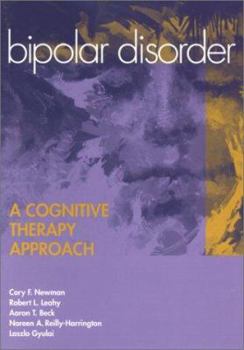Bipolar Disorder: A Cognitive Therapy Approach
Select Format
Select Condition 
Book Overview
Bipolar Disorder: A Cognitive Therapy Approach is a rich source-book of practical and sensitive guidance on bipolar disorder -- a devastating illness that until now has been treated primarily through... This description may be from another edition of this product.
Format:Hardcover
Language:English
ISBN:1557987890
ISBN13:9781557987891
Release Date:January 2002
Publisher:American Psychological Association (APA)
Length:260 Pages
Weight:1.75 lbs.
Dimensions:1.0" x 7.2" x 10.4"
Customer Reviews
5 ratings
Cognitive therapy for bipolar disorder
Published by Thriftbooks.com User , 14 years ago
Newman, C. F., Leahy, R. L., Beck, A. T., Reilly-Harrington, N. A., & Gyulai, L. (2002). Bipolar disorder: A cognitive therapy approach. Washington, DC: American Psychological Association. Overall, I liked this book and believe it to be a worthwhile read. There a few things that I did not like about the book, and I mention those here ahead of explaining what I liked about the book. This book is a composite work among several authors, and it is apparent in the multiplicity writing styles. I find it somewhat annoying when the writing style changes in mid-chapter. Another annoyance is the way the authors switch between using the terms "bipolar disorder" and "manic-depressive illness" only stating they are using "manic-depressive illness" (or "manic-depression") to honor Kay Redfield Jameson, and giving no other reason for this interchange of terminology. Finally, I missed having a glossary. A glossary would have been especially useful for those of us readers who are not familiar with all of the terminology; words such as, trait, state, and mode. These words do not appear in the index either, making it difficult to find them when one wants to review specific parts of the text that one has read at an earlier time. The first two chapters serve as an introduction and supply background information for the rest of the book. Chapter one surveys the various presentations of bipolar disorder including diagnosis, comorbidity in diagnosis, etiology, epidemiology, and prognoses for different presentations of bipolar disorder. The second chapter surveys the cognitive therapy model as it could be applied to clients who have been diagnosed with bipolar disorder. The remaining chapters can be used as a treatment manual for the practicing therapist who has clients who have diagnoses of one of the presentations of bipolar disorder. There is emphasis on the cognitive model, especially the collaborative nature of cognitive therapy. The authors are careful to point out the desirability of commencing therapy prior to clients' reaching either a fully depressed state or a fully manic state. Among several significant statements in the first two chapters, I found two overarching elements: an emphasis on the diatheses-stress model of mental disorders and the extrapolation of research on unipolar depression to bipolar disorder. I was somewhat surprised at the extrapolation from simple depression to the complexities of bipolar diagnoses, but it seems to be consistent with other research literature that I have read recently. Two of the most useful chapters for me are the chapters titled, "Moderating mania and hypomania" and "Clinical management of depression, hopelessness, and suicidality in patients with bipolar disorder." Another chapter that is personally very meaningful to me is the one titled, "Bipolar disorder and the family." This latter chapter is meaningful to me because of the work that I have done with families who have members diagnosed with bipolar
Bipolar Reference Guide
Published by Thriftbooks.com User , 16 years ago
Book is a necessary reference for therapists dealing with Bipolar I and II patients. The material is well presented and provides the therapist with source data usable in sessions with Dx patients.
Best book on the subject
Published by Thriftbooks.com User , 18 years ago
A compilation of the work of some of the most experienced people in the field, this book is intended to provide clinicians with a rich toolbox of therapeutic interventions including excellent checklists, case studies and counsel. For this subject matter, this book is as good as it gets.
An excellent, practical description of cognitive therapy
Published by Thriftbooks.com User , 21 years ago
This is an excellent book about cognitive therapy for bipolar disorder. It's a little newer than Basco's book on the same subject- both books are excellent and the reader could consult either or both to learn more about the subject. This book may have been written for psychiatrists and therapists, but I think it's well within reach for the layman, and so can be read by bipolar persons and their families as well. The writing is excellent and book is well organized too. Highly recommended. Avery Z. Conner, author of "Fevers of the Mind".
Excellent
Published by Thriftbooks.com User , 22 years ago
A complement to recent "encyclopedias" on the subject, this is an outstanding guide for the layman. More writing of this kind will be necessary to help understand this plague of our times. But this is basic, core material. This layman highly recommends it.




